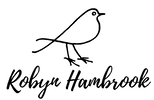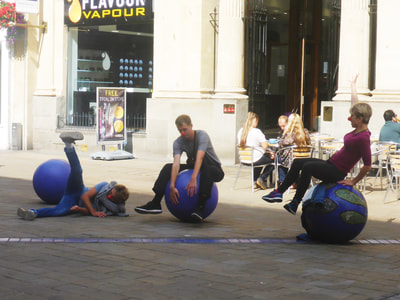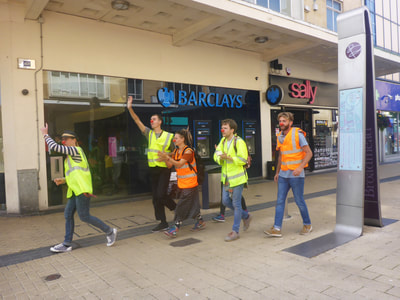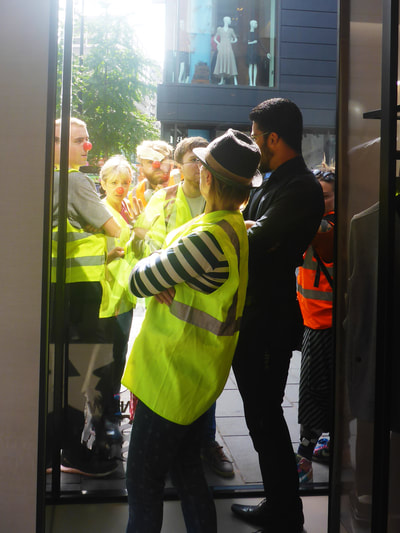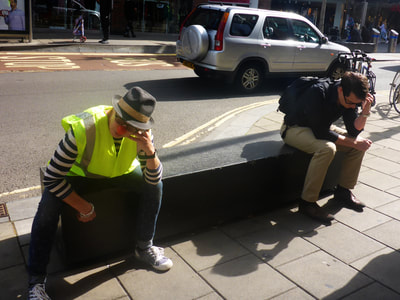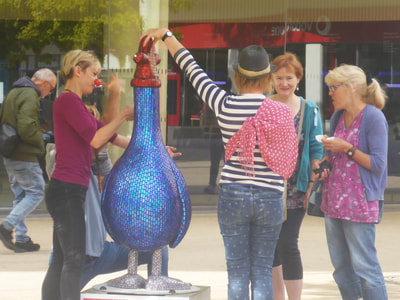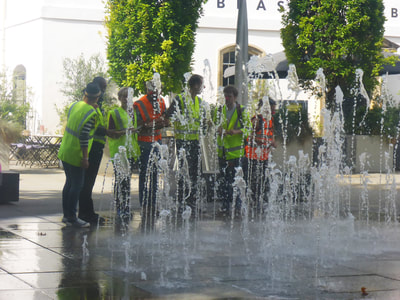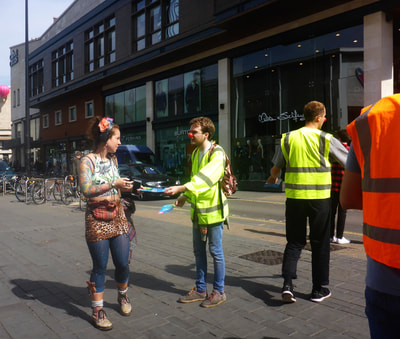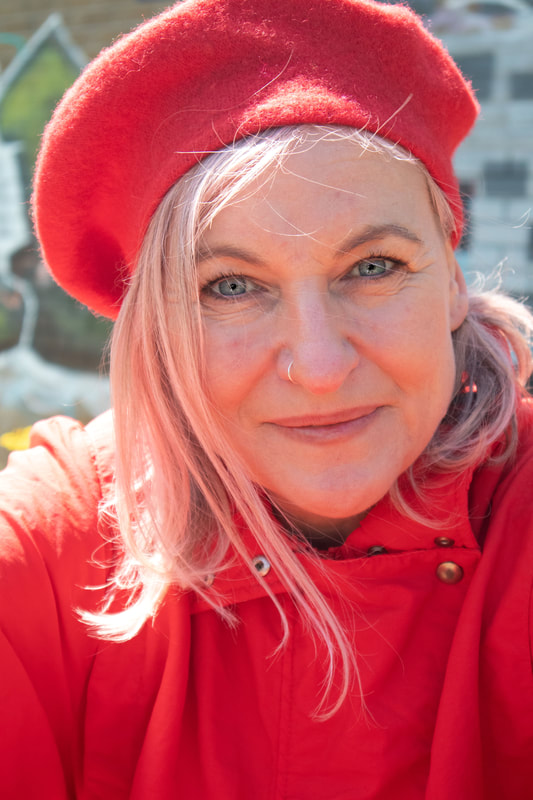Experiment #5 The Clown vs Capitalism
A giggle of clowns attempt to take back our public spaces
CONTEXT
In our cities, the impression of public space and freedom is set against a backdrop of shops, advertising and the established order of consumerism and capitalism, all hidden in plain sight. Although there are many different types of people there, the dominant ideology of capitalism pervades, seeping into the narratives of the space. A narrative might go like this; “I go outside to enjoy my free time. I meet a friend for coffee in town. I pop into Primark while I’m there buy three new things. They were so cheap, I just had to.” In French Marxist Philosopher and Sociologist Henri Lefebvre’s critique of everyday life, the capitalist production mode produces a space that is specific to it. He called for a collective appropriation of the city and “liberation of daily life, something which of course, is impossible except in a non-capitalist production mode” (Busquet 2013). One form of liberation may come in another form of street theatre. Susan C. Haedicke describes the radical power of street theatre to invade a public space, “…as the boundaries between participation in a performance and participation in daily activities become porous, the public can experience disorientation that often initiates reflection and a critical reassessment of the surrounding situation” (2013: 1).
In our cities, the impression of public space and freedom is set against a backdrop of shops, advertising and the established order of consumerism and capitalism, all hidden in plain sight. Although there are many different types of people there, the dominant ideology of capitalism pervades, seeping into the narratives of the space. A narrative might go like this; “I go outside to enjoy my free time. I meet a friend for coffee in town. I pop into Primark while I’m there buy three new things. They were so cheap, I just had to.” In French Marxist Philosopher and Sociologist Henri Lefebvre’s critique of everyday life, the capitalist production mode produces a space that is specific to it. He called for a collective appropriation of the city and “liberation of daily life, something which of course, is impossible except in a non-capitalist production mode” (Busquet 2013). One form of liberation may come in another form of street theatre. Susan C. Haedicke describes the radical power of street theatre to invade a public space, “…as the boundaries between participation in a performance and participation in daily activities become porous, the public can experience disorientation that often initiates reflection and a critical reassessment of the surrounding situation” (2013: 1).
ACTION
A group of six clowns play in Broadmead. There are three experiments 1) to play and explore building complicity in groups of threes and trying to connect with public, 2) a soft approach of mirroring a space and a more subtle attempt to connect with public and 3) as a clown chorus dressed as security, they create a spectacle as they promenade past the more upmarket shops on Philadelphia Street then back around to Broadmead. The clowns play, mirror and parody, sometimes engaging bemused public and workers in their games but mostly they are watched. In Philadelphia Street they are ‘tailed’ by a security guard to tries to get a straight answer out of them about what they are doing. He calls for back up which arrives from Cabot Circus. Without directly breaking any laws they are merely observed nervously. The clowns help people from ‘The Gym’ hand out flyers promoting a No Joining Fee offer. They employees quickly realise that this help is unhelpful as the flyers end up back in their hands. But they have had an interesting interaction. A clown hides behind a pavement sign for a Nail Bar, seeming to hide from something. Using it for cover he moves it across the breadth of Broadmead and deposits it outside a Vape shop. Still playing the game of hiding, he takes the sign from the Vape shop and moves it surreptitiously over to the Nail Bar. A young employee from a neighbouring coffee shop on his break notices and switches them back, berating the clown by saying “Stop this fucking around”.
A group of six clowns play in Broadmead. There are three experiments 1) to play and explore building complicity in groups of threes and trying to connect with public, 2) a soft approach of mirroring a space and a more subtle attempt to connect with public and 3) as a clown chorus dressed as security, they create a spectacle as they promenade past the more upmarket shops on Philadelphia Street then back around to Broadmead. The clowns play, mirror and parody, sometimes engaging bemused public and workers in their games but mostly they are watched. In Philadelphia Street they are ‘tailed’ by a security guard to tries to get a straight answer out of them about what they are doing. He calls for back up which arrives from Cabot Circus. Without directly breaking any laws they are merely observed nervously. The clowns help people from ‘The Gym’ hand out flyers promoting a No Joining Fee offer. They employees quickly realise that this help is unhelpful as the flyers end up back in their hands. But they have had an interesting interaction. A clown hides behind a pavement sign for a Nail Bar, seeming to hide from something. Using it for cover he moves it across the breadth of Broadmead and deposits it outside a Vape shop. Still playing the game of hiding, he takes the sign from the Vape shop and moves it surreptitiously over to the Nail Bar. A young employee from a neighbouring coffee shop on his break notices and switches them back, berating the clown by saying “Stop this fucking around”.
ABOUT ROBYN
Robyn is a Bristol-based director, teacher and performer. With over 20 years experience she is a passionate practitioner of clowning, physical theatre, circus and street arts. She has a MA in Circus Directing, a Diploma of Physical Theatre Practice and trained with a long line of inspiring teachers including Holly Stoppit, Peta Lily, Giovanni Fusetti, Bim Mason, Jon Davison, Zuma Puma, Lucy Hopkins and John Wright.
Over the past five years she has been exploring the meeting point of clowning and a deep desire to address the injustices in the world. This specialism has developed through her Masters Research ‘Small Circus Acts of Resistance’, on the streets and in protests with the Bristol Rebel Clowns and in research residencies with The Trickster Laboratory. Robyn’s Activist Clown research has led to collaborations with Jay Jordan (Laboratory of Insurrectionary Imagination, France), Clown Me In (Beirut), LM Bogad (US), Hilary Ramsden (Greece) and international Tricksters; ‘The Yes Men’ (US). During the pandemic in 2020, Robyn set up The Online Clown Academy with Holly Stoppit and developed a series of Zoom Clown Courses. Robyn’s research, started during her Masters, has been exploring the meeting point of clowning and activism, online, in the real world and with international collaborators. With this drive to explore political edges of her work she has also dived back into the world of the Bouffon; training with Jaime Mears, Bim Mason, Nathaniel Justiniano, Eric Davis, Tim Licata, Al Seed and the grand master Bouffon-himself; Philippe Gaulier. Keen to explore the intersection of clowning and politics, Robyn is driven to create collaborative, research spaces, testing and pushing the limits of the artform to create new knowledge and methodologies for her industry and strengthen partnerships for future work. Some of her most recent collaborations and teaching projects have included the Nomadic Rebel Clown Academy (5-day Activist Clown Training), The Laboratory of the Un-beautiful (Feminist Grotesque Bouffon Training for Womxn Theatre Makers) and the Clown Congress (annual gathering of clowns, activists & academics collectively exploring what it means to be a clown in this current era) |
